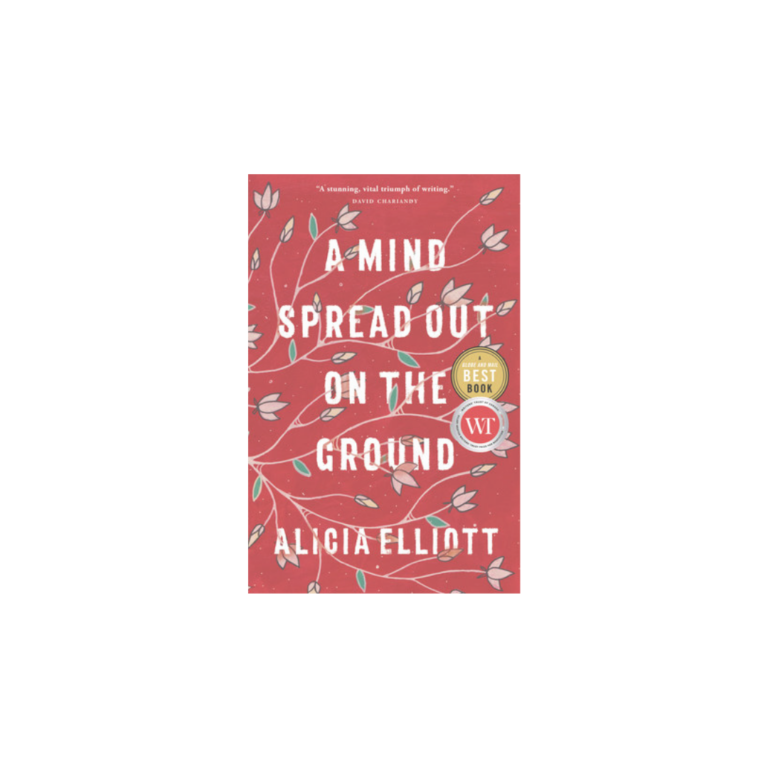Review of A Mind Spread Out on the Ground
Penguin Random House. 2020. 240 pages.
“Is there a language of depression?” Alicia Elliott asks in A Mind Spread Out on the Ground, her mind-blowing collection of essays on intergenerational trauma due to residential schools and its effect on mental health. Elliott, a Tuscarora writer, captures the personal wounds caused by Canada’s ongoing systemic injustices. She discusses displacement while addressing the insensibility of government systems. Eliot’s visceral essays capture settler issues, colonialism, Indigenous governance and sovereignty, the Canadian reconciliation Act and, most importantly, mental health problems. In retelling her lived experiences, she brilliantly addresses the Canadian legal system’s issues and attempts to ‘reconcile the trauma of Indigenous communities.
Elliott is precise in representing depression through various literary devices such as metaphors, notably in the book’s title, which comes from the words “Wake’nikonhra’kwenhtara:’on,” – a Mohawk’s expression that loosely translates to something “literally stretched or sprawled out of the ground.” Through navigating this unique imagery of depression as if the brain is physically ‘spread on the ground,’ Elliott paints a vivid imagery of her emotions. The reader can see a wet mess of organs on the ground, feel the chaos of the cluster and clumps splattered, revealing everything about the brain; perhaps it’s this chaos that Elliott is trying to convey to its readers about the disoriented state of mind. Along with dedicating the title of her book to this striking image of the mental state, she repeatedly focuses on defining depression in various forms, emphasizing the many ways in which it impacts the victims.
The entire first chapter elaborates on the different ways depression is felt. Using analogies, personification and allusions, Elliott puts several perspectives of depression in the reader’s mind. From the very beginning, Elliott grabs the reader’s attention by creating remarkable parallels: “As far as analogies go, comparing depression to a demon is a pretty good one.” In this fascinating analogy, she personifies depression by giving it demonic features, mentioning how it “[leaves] you disconnected and disembodied…both whisper evil words and malformed truths.” These characteristics paint diverse and accurate images of depression and show in-depth the scars that colonialism has on Indigenous societies. Specifically, these creative connections of depression to a damaged brain or demonic entity strike the readers with a different, more visceral, honest view on mental health.
Moreover, Elliott simultaneously compares language and colonialism to depression itself through comparative lenses. Language, she says, is the ”opposite” of depression; she associates language with liberation while contrasting it with depression which “takes away your tongue.” Through this fascinating contrast, she connects language as a form of freedom snatched away due to colonialism. Elliott explains how both depression and colonialism ‘leave an empty vessel.’ By snatching the identities of individuals, snatching away their language, colonialism leaves the person empty; likewise, depression can feel as if there is nothing left inside.
Not only does Elliott focus on the mental space, but she also expands on the importance of physical space. She discusses the feeling of displacement created by colonialism and the legal systems; she compares herself with a parasite: “As a poor, mixed-race kid, I was treated like a parasite…” Elliott extends this analogy of the parasite in the chapter “Scratch,” in which she writes about her experience with Social Services as a child. She creatively compares the approach of such government systems to her childhood approach to having head lice. Elliott explains that she would kill the obvious “bright white nits’ and leave the less detectable darker ones. She suggests that Social Services took a similar strategy: “They don’t solve the problems of poverty or racism or violence or mental illness. They just hide them away.” Here, Elliott speaks about the struggles of maintaining a particular ‘look’ for the social services people or constantly living in fear of being taken away from your family. The fear these ‘justice’ systems have put in Indigenous families reflects insensibility and dehumanization.
A Mind Spread Out on the Ground is a collection of well-researched essays combining Elliott’s personal experiences with statistical data and written in an intriguing way that opens up a new perspective for the readers. She directly addresses the readers through provocative questions; and takes them through her writing process, allowing them into her private, mental space. Through eloquent prose and various literary techniques, With her unpredictable and impressive storytelling, Elliott offers a new and intriguing stance on settler-colonialism and mental health.

